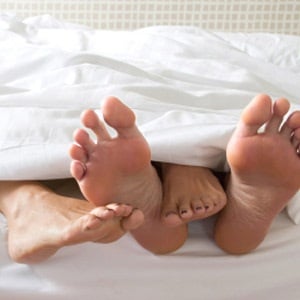
Carte Blanche Medical’s story last night about narcolepsy made it clear again how this often misunderstood sleep condition, mostly portraying someone spontaneously falling asleep anywhere and everywhere, is no joke.
Unfortunate awakenings
A pregnant mother writes in to the Sleep Expert, Dr Kevin Rosman, and gives some insight as to how disturbing narcolepsy can be for the sufferer:
"I am now 20 weeks pregnant, and recently my unfortunate awakenings have started up again with a vengeance – it's now happening every night.
It always happens about an hour after I fall asleep - I awake to something that's happening in a dream, but I think I'm awake. I interact physically (jump out of bed etc), talk to people, then eventually figure out that I'm not really awake and go back to sleep.
The problem is that I am exhausted the following day and can't focus at work, and feel downright horrible. Obviously I can't take my meds while pregnant (Rivotril) - is there anything else I can do to try and get it under control?"
What is narcolepsy?
Narcolepsy is a chronic sleep disorder, known as dyssomnia, and the condition is characterised by excessive daytime sleepiness (EDS). This leaves the sufferer experiencing extreme fatigue, and they may fall asleep at work or at school. Narcoleptics usually experience disturbed nocturnal sleep and an abnormal daytime sleep pattern, which can be confused with insomnia.
Narcolepsy is a neurological sleep disorder. It is not caused by mental illness or psychological problems. It is most likely affected by a number of genetic abnormalities that affect specific biologic factors in the brain, combined with a set off from environment, such as a virus.
The four classic symptoms of the disorder are:
- Excessive daytime sleepiness
- Cataplexy: sudden, brief episodes of muscle weakness or paralysis brought on by strong emotions such as laughter, anger, surprise or anticipation.
- Sleep paralysis: paralysis upon falling asleep or waking up.
- Hypnagogic hallucinations: vivid dream-like images that occur at sleep onset.
Disturbed sleep at night such as tossing and turning in bed, leg jerks, nightmares, and frequent awakenings, may also occur. Unrelenting excessive sleepiness is usually the first and most prominent symptom of narcolepsy.
Patients with the disorder experience irresistible sleep attacks throughout the day, which can last for 30 seconds to more than 30 minutes, regardless of the amount or quality of prior nighttime sleep. These attacks result in episodes of sleep at work and social events, while eating, talking and driving, and in other similarly inappropriate occasions.
Diagnosis and treatment
One procedure that can be used to test for narcolepsy is polysomnography The procedure takes place in a dedicated sleep laboratory where the patient is linked up to a range of electrodes, and breathing and oxygen levels are monitored at the same time.
Treatment
At present there is no cure for narcolepsy, but the symptoms can be controlled with behavioural therapy and medication.
Stimulant drugs may be used to treat the excessive daytime sleepiness may be treated with stimulant drugs, while cataplexy and other REM-sleep symptoms may be treated with antidepressant medications.
While medications can reduce the symptoms, they cannot alleviate them entirely, and many medications do have side effects.
More information:
Visit the Sleep Centre.
(Joanne Hart, Health24, August 2010)
Sources: Dr Kevin Rosman "Narcolepsy", Health24
Wikipedia
(Image: iStock)




 Publications
Publications
 Partners
Partners















